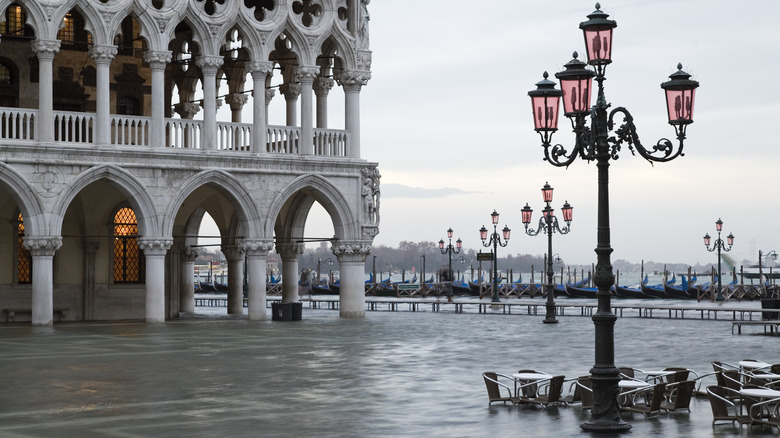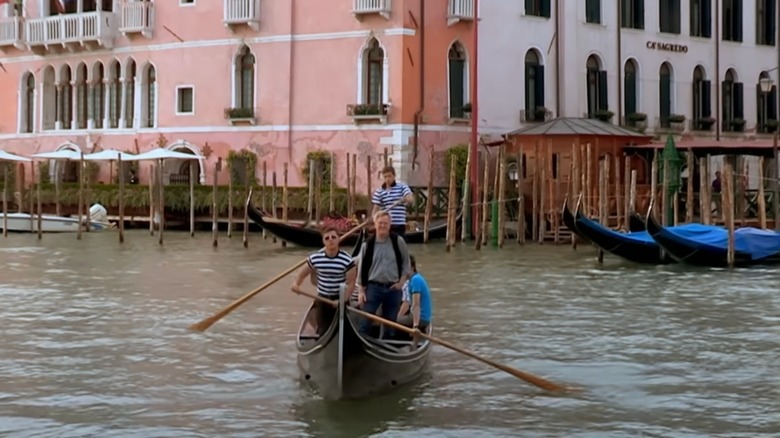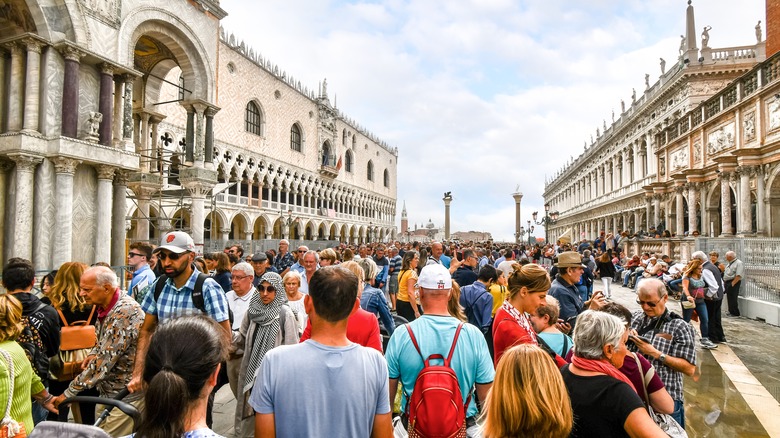Is Venice Actually Sinking And Should You Even Visit? Here's What Rick Steves Says
Italy has some beautiful islands and cities, and of all of them, Venice may be one of the country's most well-known and picturesque destinations. Known as the "City of Canals," Venice is built across more than 100 different islands in a lagoon on the Adriatic Sea, and because of this, the city is slowly sinking — and has been for a long time. Guidebook author and European travel expert Rick Steves has some thoughts about Venice's gradual descent into the sea, the flooding that comes with that, and why you should still visit Venice, though perhaps with some additional considerations.
Over the past 100 years, Venice has sunk by 9 inches thanks, in part, to the settling of the city's underlying lagoon sediment, according to Rick Steves' Europe. Combine the city's sinking with rising sea levels, and it means that Venice can flood fairly frequently, with the most floods happening in late fall through winter. "Acqua alta," which means high water in Italian, is used to describe these seasonal floods, which can transform Venice's iconic St. Mark's Square into a lake — so, pack your rain boots for your Venice vacation.
Venice's flooding is amplified by climate change
Venice has faced flooding for thousands of years, but things seem to be getting worse. In 2019, more than 85% of Venice flooded, per NPR. Mayor Luigi Brugnaro posted about the situation on Twitter, referring to the floods as an example of "the effects of climate change." He was right. Scientific estimates show Venice facing rising sea levels of several inches or more by 2100 because of climate change.
On his blog, Steves wrote about the 2019 Venice flood and, more broadly, climate change. "As a traveler, I see the reality of our changing climate everywhere," Steves said. "And as a business owner who promotes and profits from carbon-emitting travel, I understand that I play a big role in that — which is why my tour company has pledged to donate $1 million a year to nonprofits that fight climate change."
Steves acknowledged the balance that travelers face — wanting to experience all the fascinating things that the world has to offer, but to be aware how the very act of traveling can have negative impacts on the world. Carbon emissions from plane travel, for example, are contributing to climate change. Doing what you can to offset your carbon footprint is something to consider, if for no other reason than it helps protect the places that you want to see — places like Venice.
Rick Steves still loves Venice, even with the tourists
While Venice is most decidedly sinking, it's still getting plenty of visitors, but at the same time, it is losing its citizens. There's one Venetian resident for every 140 visitors with some 20 million people visiting the city each year. On an episode of the Travel with Rick Steves podcast in 2017, the host spoke with Dr. Salvatore Sattis, an Italian archaeologist and author, about the challenges facing Venice. With fewer citizens and more visitors, they talked about how it seemed like the city could face a loss of its soul and community spirit.
Steves has been traveling to Venice for 30 years, and along with increased threats of flooding and other changes to the city, it begs the question of whether people should still go. For Steves, the answer seems to be yes. On Rick Steves' Europe website, he wrote: "Despite all the changes, Venice still awes me with its ethereal beauty and lovely views — which can hit you from any direction (literally — always look both ways after crossing over a Venetian bridge). If you pause anywhere in Venice and simply observe, you'll witness the one-of-a-kind wonder of this forever-unique city on the lagoon." If you are planning to visit, Steves recommends visiting for more than just a day, noting that Venice is particularly lovely at night.


